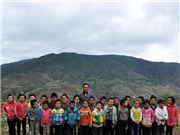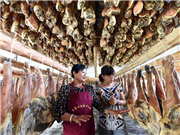

3) We will continue to support the development of regions with unique features at a faster pace.
We will support the economic and social development of Xinjiang, Tibet, and the Tibetan ethnic areas in Sichuan, Yunnan, Gansu, and Qinghai provinces, and provide effective one-to-one assistance to designated areas. We will accelerate the upgrading of cities once dependent on resources that are now depleted, and push forward with the relocating and rebuilding of old industrial areas within cities and independent industrial and mining areas. We will formulate guidelines and planning for supporting the development of old revolutionary base areas. We will continue to promote development in contiguous poor areas as a whole in order to help alleviate poverty.
4) We will actively advance the new type of urbanization.
We will carry out the plan on urbanization with the focus on three tasks, each concerning 100 million people: granting urban residency to around 100 million people who have moved to cities from rural areas, rebuilding run-down areas and “villages” inside cities where around 100 million people live, and guiding the process of urbanization for around 100 million rural residents in the central and western regions. We will coordinate efforts in carrying out comprehensive pilot projects for advancing the new type of urbanization nationwide and in launching trials for comprehensive reform in small and medium-sized cities, and we will explore the establishment of mechanisms for sharing the costs associated with helping people from rural areas who have moved to cities become urban citizens, of well-regulated, diversified, and sustainable mechanisms for investment and financing to ensure funding for urban development, and of new models of administrative management that encourage innovations and reduce costs. We will improve the overall distribution of areas that are undergoing urbanization, formulate planning for cross-provincial city clusters, and promote the coordinated development of city clusters in key regions. We will move faster to construct multi-purpose networks for underground pipelines and facilities for flood prevention and rainwater control in cities. We will ensure the effective governance of urban maladies such as pollution and traffic congestion. We will carry out pilot projects in more cities and counties to replace multiple plans for local development with one master plan. By the end of 2015, 55.77% of China’s population is expected to be comprised of permanent urban residents, and 37.9% is expected to be comprised of registered urban residents.
7. Making unremitting efforts in energy conservation, emissions reduction, low-carbon development, and ecological and environmental protection
In addressing problems concerning the environment, we will continue to treat root causes, conduct monitoring and regulation over the whole process of production, and enforce severe punishments for violations or damage to the environment. We will attach greater importance to green, circular, and low-carbon development so as to improve the ecosystem and environment of China and build a beautify country.
1) We will improve the systems for promoting ecological progress.
We will issue and implement guidelines on accelerating ecological advancement, and on the basis of research, formulate a plan for implementing the structural reform for promoting ecological progress and a system for setting targets for ecological improvement. We will establish demonstration zones for enforcing compensation for ecological damage and for promoting ecological progress. Compensation for ecological damage will be levied on a trial basis at key water sources, in major drainage basins, and across drainage basins. We will launch pilot projects to promote a cap-and-trade system for emissions. We will strengthen the protection of mudflats and improve the management of their development. We will carry out trials of allowing enterprises to commission a third party to treat their pollution, and provide special financing for encouraging energy efficiency and provide green loans for environmentally responsible businesses. We will explore the introduction of compulsory environmental pollution liability insurance.
2) We will strictly control both energy intensity and total energy consumption.
We will continue to implement the early-warning and regulatory system for energy conservation and emissions reduction, tighten control over energy intensity, improve management of total energy consumption, and strictly evaluate the performance of energy conservation targets and correspondingly pursue accountability. For areas affected by severe smog, regions where conserving energy is difficult, and industries with overcapacity, we will strictly control the number of energy-intensive projects and put into effect policies for coal use reduction and for replacing some coal use with alternative energy sources. We will continue to launch key energy-conservation projects and pilot and demonstration projects that aim to establish a circular economy, and vigorously promote the recovery of resources from industrial and household waste.
3) We will strengthen pollution control and ecological protection.
We will fully implement the ten measures on controlling air pollution as stipulated in the Air Pollution Prevention and Control Action Plan, implement the action plan for preventing and controlling water and soil pollution, and strengthen efforts to prevent and control air pollution in key areas and water pollution in key drainage basins and sea areas. We will upgrade coal-burning power plants to achieve ultra-low emissions. We will promote clean and efficient use of coal. We will accelerate efforts to increase the quality of refined oil products. We will remove more high-emission vehicles from roads. We will redouble efforts to control the factors causing sandstorms, treat soil erosion, prevent the spread of stony deserts, improve the geological environment in mining areas, and protect ecosystems on grasslands and farmlands. We will launch a new group of projects to return marginal cultivated land to forests or grasslands and return grazing land to grasslands and major projects to develop forests for ecological conservation. In 2015, we will return an additional 667 thousand hectares of cultivated land to forests or grasslands, and afforest six million hectares of land. We will vigorously develop energy conservation and environmental protection industries. We will advance desalination and comprehensive utilization of seawater.
4) We will actively address climate change.
We will implement the Interim Measures for the Management of Carbon Emission Rights Trading, and continue the pilot programs and demonstrations of low-carbon development. We will intensify South-South cooperation on climate change, and play a constructive part in the 2015 United Nations Climate Change Conference in Paris.
8. Working harder to ensure and improve people’s wellbeing
We will integrate our efforts to improve people’s wellbeing and invigorate social and economic development, and increase the investment in and effective supply of public goods and services.
1) We will take well-targeted steps to ensure employment.
We will implement and improve policies to increase employment and entrepreneurship, and encourage individuals to start their own businesses and make innovations. We will fully carry out the program for promoting the employment of college and university graduates and guiding college and university students in starting up businesses, and provide vocational skills training to rural migrant workers. We will increase our assistance to groups who have difficulty in finding a job; properly solve the issue of resettling and providing employment to workers laid off due to SOE mergers and reorganizations, the phasing-out of excess production capacity, or the shutdown of outdated production facilities; and implement and improve the policy on using unemployment insurance funds to support enterprises in ensuring job opportunities.
2) We will improve the social security system.
We will formulate an overall plan for deepening reform of the old-age insurance system and, at the appropriate time, launch trials of commercial pension schemes that allow for deferred payment of individual income tax. We will raise government subsidies for the new rural cooperative medical care system and the basic medical insurance for nonworking urban residents from 320 yuan to 380 yuan per person per year and also increase the annual individual contribution from 90 yuan to 120 yuan per person. We will introduce major disease insurance for rural and nonworking urban residents and the system of emergency assistance and temporary assistance for disease treatment across the country, and intensify efforts to provide medical assistance for treatment of major and critical diseases. We will improve the subsistence allowance system for both urban and rural residents and the social security policy for farmers whose land has been expropriated. We will raise subsidies and living allowances for entitled groups. We will establish a sound mechanism for supporting recovery and reconstruction efforts in areas hit by catastrophic natural disasters.
 |  |
Day|Week

 Tsinghua junior makes over 10,000 yuan a day by selling alumnae's used quilts
Tsinghua junior makes over 10,000 yuan a day by selling alumnae's used quilts Graduation photos of students from Zhongnan University
Graduation photos of students from Zhongnan University A school with only one teacher in deep mountains
A school with only one teacher in deep mountains Glimpse of cultural heritage "Xilankapu"
Glimpse of cultural heritage "Xilankapu" Homemade cured hams in SW China
Homemade cured hams in SW China Breathtaking buildings of W. Sichuan Plateau
Breathtaking buildings of W. Sichuan Plateau Graduation photos of "legal beauties"
Graduation photos of "legal beauties" Top 10 most expensive restaurants in Beijing in 2015
Top 10 most expensive restaurants in Beijing in 2015